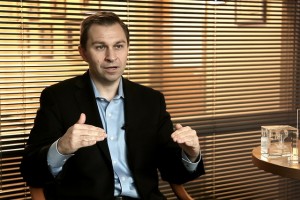Genome Engineering
Harvard University Professor David Sinclair on centenarian families, ovarian stem cells, and fixing genetic di...
I was going to say a little bit about the idea of treating ageing or anti-ageing treatments. This is a complex topic. First of all, I think I should say that I’m all for that; I think we want that, and the reason why is because ageing is fundamentally a horrible thing. It’s part of the human condition which is almost maddening and somewhat similar, I say to the students sometimes, to a situation where somebody comes to you and they tell you that in 20 years some men are going to come and knock on your door in the middle of the night, they’re going to take you away and they’re going to torture you for about two years until you die. That’s pretty much our condition as human beings. That’s what happened to both my parents, I’ve watched that happen to them as they were killed by diseases of ageing. So, ageing is a horrendous thing.
In terms of the idea of treating ageing, there are problems I think with thinking about what you mean by treating ageing and what is a treatment for ageing. I’ve argued that you can’t really make a distinction between ageing and ageing-related disease, although sometimes people have done. A treatment for ageing is a treatment for ageing-related disease as well, so does that mean that having a coronary bypass operation or having a hip replacement operation is a treatment for ageing? Is that an anti-ageing treatment? That’s not usually what people mean.
It also acknowledges one of the things we’ve learned in the laboratory, which is you can intervene and prevent or at least decelerate the appearance of ageing-related diseases. This is very strong across the animal models. But by that definition, that would mean that, for example, things that just prevent even one aspect of ageing are anti-ageing treatments. For example, sunscreen prevents UV radiation damage to your skin, which is part of ageing, so you can use sunblock, and the sunblock will prevent it; it will delay and protect against that aspect of ageing. So that’s an anti-ageing treatment. Or even if you go to the hygienist and you have the plaque taken away from the top of your teeth and that prevents ageing of your teeth, that’s a preventative treatment of an aspect of ageing, so that’s an anti-ageing treatment.
The older notion of anti-ageing treatment, something against the whole of ageing, is really an interesting topic. In C. elegans, you can manipulate individual genes and see extraordinary increases in lifespan: you can double, triple and quadruple the lifespan, and one group even increases them up to tenfold. An implication of that is what drew me into this field: there’s some sort of extraordinary core processes of ageing which underlie the whole of ageing, and if you could understand that, you could do extraordinary things with human beings, you could slow ageing right down and just stave off the diseases of ageing for many, many decades. But I think that that notion was also consistent with some of the theories of ageing that were predominant in the 90s, particularly the oxidative damage theory.
People expressed the idea that if you could enhance maintenance processes within organisms, you could essentially control completely the accumulation of damage and you could extend lifespan dramatically. This is what people thought they were doing but more recently it’s become clear that the higher up the evolutionary ladder you go from worms up to flies, to mice, to rhesus monkeys, to humans, the less innate plasticity there seems to be in aging.
One of the things which I think has been a big shock over the last years was the results of tests of an intervention called dietary restriction on rhesus monkeys. This is an intervention which, in rodents and many other short-lived animals, slows ageing down dramatically: in mice and rats, you get a 50% increase in lifespan suppression of a whole range of ageing-related diseases. This was tested on rhesus monkeys, and the results were really quite disappointing. Most of the effects that were seen, the small effects, looked as if they were rather likely to be rescued from the harmful effects of overeating, which is not what you see in rodents and something quite different.
So I think that at the moment, it doesn’t seem likely that there’s any sort of magical plasticity that you can tap into in the way that you can in, for example, C. elegans. However, things change very rapidly within the ageing field, and that’s one of the features of this field, which is rather marvellous if you’re working in it. It’s so unstable theories rise and fall very, very quickly.
Something that’s happened very recently which is just incredible is the development of recent findings in rodents looking at a particular type of cell called the senescent cell. This is a very particular type of cell that accumulates with age and has been shown to contribute to the generation of a whole range of different aging-related diseases from multiple forms of cancer to cataracts, cardiovascular disease and many other kinds of pathology.
Experimentally, in the mouse, if you clear these cells, which you can do through complex genetic interventions and you can now do it with a class of drugs that are called senolytic drugs, you get these remarkable effects on the health, you get essentially a broad-spectrum protection against diseases of aging. The mice still get the diseases; they just get them later. So it isn’t affecting the entire ageing process, but what it is doing, it seems to be affecting as it were a cause of senescent multimorbidity, an underlying cause of multiple diseases of ageing.
I don’t want to give the impression that I’m being pessimistic about the ageing field. I think that, in a way, I feel both pessimistic and optimistic at the moment because there were a number of elements of the field that looked extremely promising, like this plasticity in ageing that you see in the short-lived animal models, the oxidative damage theory and the whole damage theory of ageing which as an intervention was going to have dramatic effects, a dietary restriction which looks quite disappointing etc.
The thing which doesn’t seem to be there in humans is this natural plasticity in aging that you see in shorter-lived animals at least in terms of the possibility of slowing aging down. One of the recent results that I think is consistent with that is that the maximum lifespan for human beings worldwide for many many years, for many decades was increasing year-on-year but it’s actually hit a ceiling, it’s plateaued and it did that around about the year 2000.
And it’s even becoming clear that some of the very long-lived people, the real record-holders worldwide, a number of them may be essentially unreliable evidence. For example, recently, a case has been made that a woman who was thought to be the oldest woman in the world, Jeanne Calment, was actually her daughter who switched identity when her mother died.
On the other hand, I think if we kind of turn things upside down, one can make the case that there is a plasticity in human ageing, but it actually runs the other way. You can accelerate ageing in human beings, and that’s something that very much seems to happen when people eat too much. When people become very overweight, it would appear that the ageing process is speeded up. So, one possibility is that interventions that actually protect against ageing in the short-lived animal models could actually be used as ways to prevent accelerated ageing in people who are overweight.
But in terms of optimism, the thing that really makes me optimistic is the possibility of really understanding ageing. This is quite aside from what you can do with the knowledge; that must be possible. I think over the last few years, the basic concepts of ageing have changed so much, evolved and transformed so much that we must be coming close to the point where we have the basic foundation of an understanding of ageing. That has to be the way forward to be able to see what can be done in terms of preventing late-life diseases and allowing people to live longer, healthier lives in the future.

Harvard University Professor David Sinclair on centenarian families, ovarian stem cells, and fixing genetic di...

Developmental psychologist Uta Frith on autism, social interaction, and the difference between mentalizing and...

Medical Scientist Brian Hoffman on the discovery of adrenaline, the “fight or flight response”, and the use of...